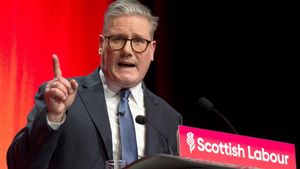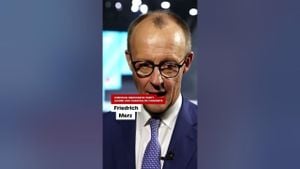Ukrainian TV host and blogger Anatoliy Anatolich has stirred conversations on the topic of language use and identity by publicly defending singer Svetlana Loboda's choice to perform predominantly in Russian, even as discussions around the Ukrainian language intensify.
On his Instagram page, Anatolich, who has garnered attention for his remarks on safeguarding the Ukrainian language, articulated his concerns about the rising influence of the Russian language within Ukraine. "I grew up in Kryvyi Rih, a Russified city. I was not shown or told about the significance of my native language. I realized it myself as I grew up. I still recall 2004, standing as a student on Kryvyi Rih's square, and for the first time, we spoke to each other in Ukrainian. I recall landing on Hit FM back then, when I inaccurately claimed I was fluent in Ukrainian, and later had to learn it because I wanted to work on the radio. Thank you to my teacher, Oleksandr Avramenko," he expressed.
His comments came amid rising discontent among some social media users who pointed out Loboda's continued performances in the Russian language, especially abroad. One commenter asked Anatolich, "Why don’t you say this to Loboda? She understands the value of her native language, so why promote 'Moskalski' around the world? The question is rhetorical." This sentiment highlights the growing divide within Ukrainian society over language and cultural allegiance, particularly following the events of 2022.
Responding to the backlash, Anatoliy defended Loboda. "You want me to show our correspondence in Ukrainian? She lives not in Ukraine. Here she has Ukrainian songs. It is her business what she does abroad—in Kazakhstan, the Baltics, Azerbaijan, and other countries. That’s her market. It’s not like she’s performing in Russia, note this," he countered.
Anatolich's position reflects both personal and cultural complexity surrounding language and identity among Ukrainians. He acknowledges the challenges of daily life which sometimes compel families to communicate in Russian even as they strive to cultivate Ukrainian language skills. "I see and hear more Russian used again because it’s so convenient. Even my children at school, for example, probably communicate this way at home. I sometimes slip back to Russian when spoken to. I forget sometimes, or I understand it’s genuinely more comfortable for them. But I don’t want them speaking this language. I hope they transition to English or French. The Ukrainian language once again needs to be defended. It needs to be saved from ourselves," Anatolich shared.
This discussion is particularly relevant as Ukraine navigates its cultural identity amid geopolitical challenges. The tensions around language use often spotlight differing loyalties and perspectives within society. Renowned for her artistic talents, Loboda has faced criticism for maintaining her connection to Russian-language music, even after severing ties with Russia post-2022.
Loboda's continuing performances resonate with her audience outside of Ukraine, providing her with substantial gain within markets where Russian music thrives. Critics argue, though, as Anatolich's comments suggest, this practice could dilute the emphasis on selecting Ukrainian over Russian, especially when many are working diligently to uphold Ukrainian language and culture as fundamental national identifiers.
Drawing from his upbringing, Anatolich's advocacy for the Ukrainian language highlights his intent to preserve cultural integrity through careful linguistic choices at home and within the public sphere. He laments the fading fervor for Ukrainian, which surged during pivotal moments like the Maidan protests and the conflict with Russia, hinting at the necessity of reigniting this sentiment.
At the heart of this debate is the idea of identity—how language defines individual and collective personas, and what it means to be Ukrainian. The increasing tolerance toward Russian once again pushes the discussion front and center on social media, compelling both public personalities and average citizens to evaluate their language choices. Caught between cultural expression and commercial viability, artists like Loboda navigate these tumultuous waters carefully.
Although his defense of Loboda was met with mixed reactions, Anatoliy Anatolich’s comments open up nuanced conversations within Ukraine about how to forge connections between language, identity, and cultural pride as the nation grapples with its past and hopes for its future. His conclusion resonates: "The Ukrainian language needs presentation and preservation, again and again. It’s part of who we are, and we must fight for it every day."



